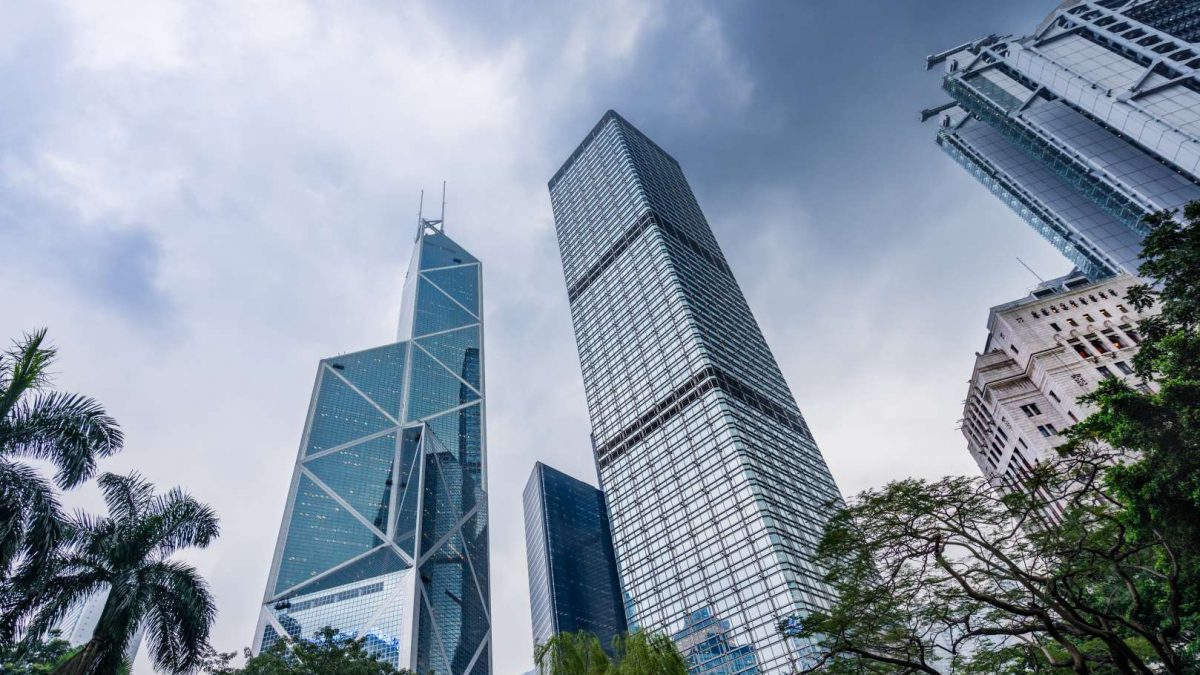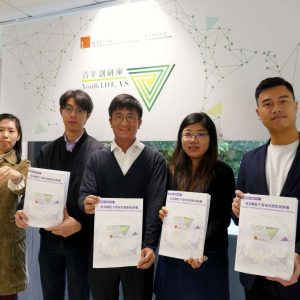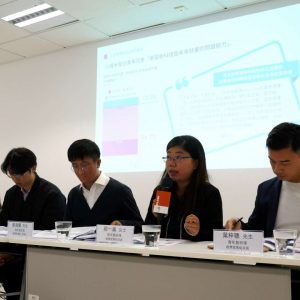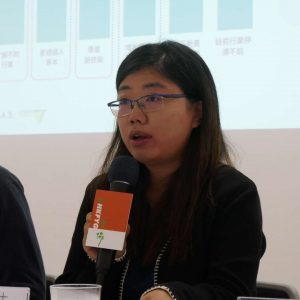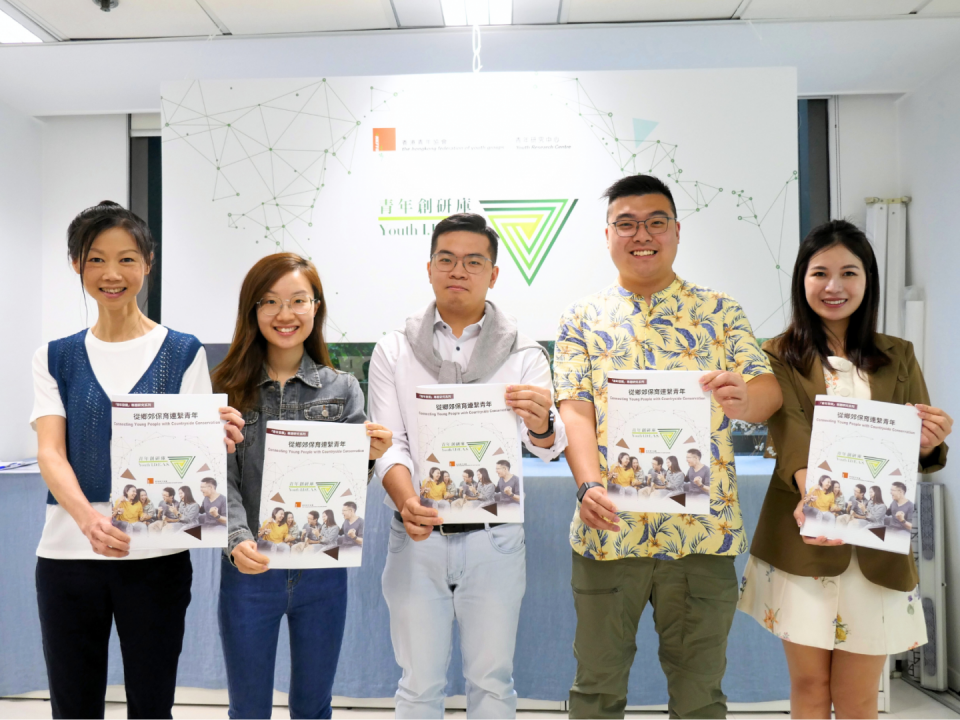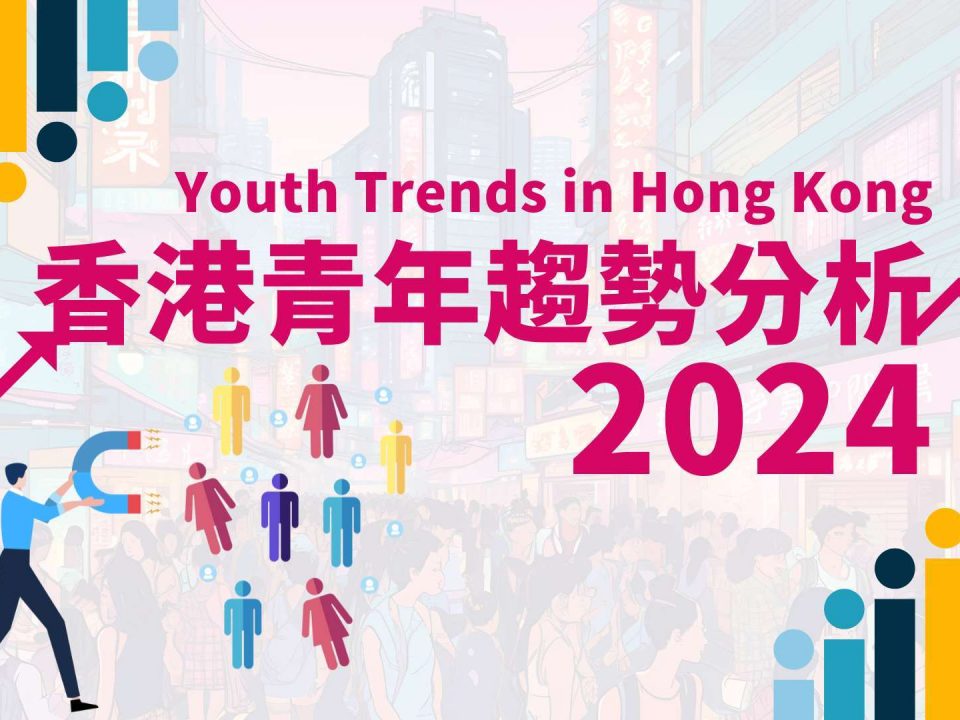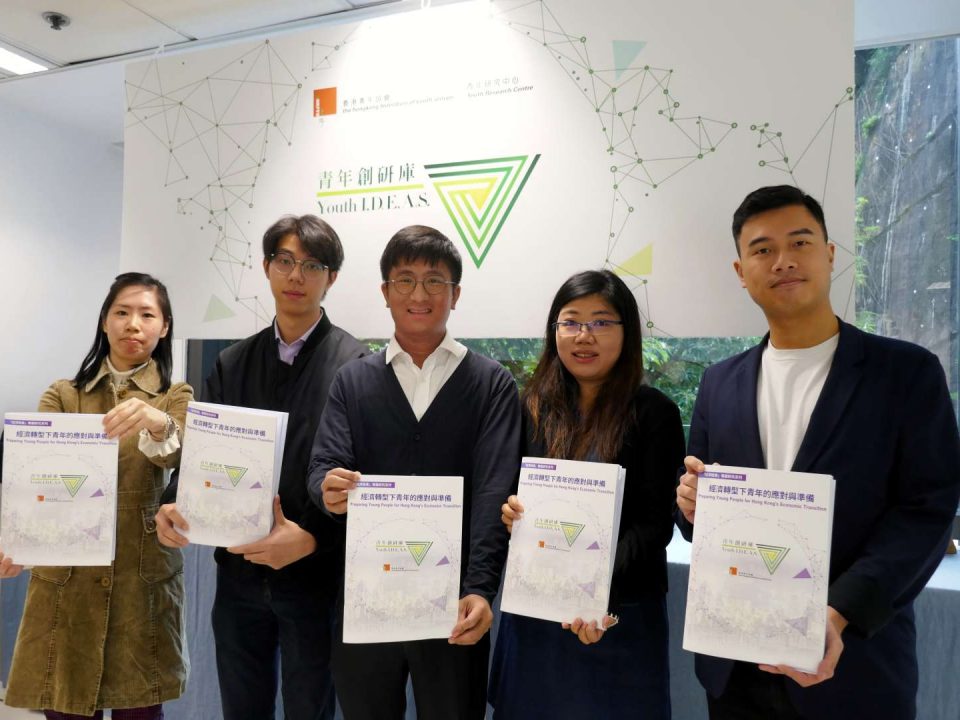Preparing Young People for Hong Kong’s Economic Transition
Youth I.D.E.A.S. 81
Economic & Employment —— Preparing Young People for Hong Kong’s Economic Transition
Hong Kong, as an externally-oriented economy, has been affected as the global environment has become more challenging, due to the slowing global economy, prospects of increased protectionism and increases in geopolitical tensions. Youth, as the engine of social progress and economic development, are an important component of human capital. How do young people view the economic prospects of Hong Kong, given the economic transition and the increasingly competitive environment? Their perspectives on economic development strategies, as well as their personal career planning and preparation, are issues worthy of societal attention.
This study collected data between September and October 2024, by reviewing literature, conducting onsite surveys with 600 Hong Kong youths aged 18-34, 20 young people, and interviewing 5 experts and academics
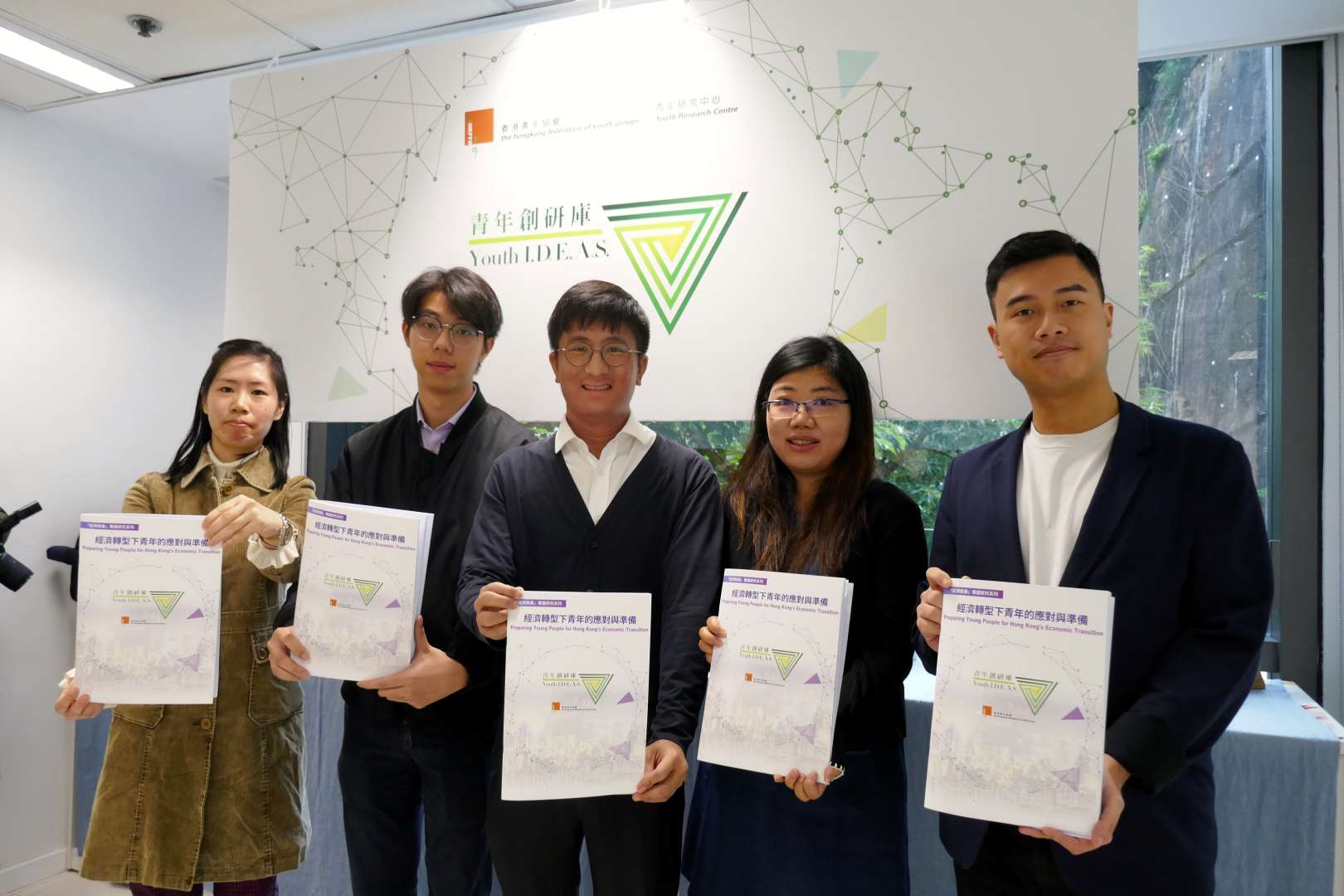
發布文件
Click to Read More
Research Background
Hong Kong, as an externally-oriented economy, has been affected as the global environment has become more challenging, due to the slowing global economy, prospects of increased protectionism and increases in geopolitical tensions. The victory of Donald Trump in the recent US presidential election only adds more financial uncertainty around the globe, including Hong Kong. The city’s financial future, in particular its trading prospects, remains unclear.
Hong Kong's economic structure is concentrated on four traditional pillar industries: financial services, tourism, trading and logistics, and professional and other producer services. These sectors have typically contributed more than 50% of Hong Kong’s Gross Domestic Product (GDP) and, as of 2022, employed approximately 1,449,800 individuals[1]. However, in more recent years, the international investment environment has changed, putting strains on the financial sector and its related industries[2]. Even though Hong Kong has introduced six priority industries since 2009, given these industries currently account for less than 10% of GDP, its economic structure has not significantly changed. Despite moderate growth in Hong Kong’s economy this year, the third quarter recorded a year-on-year GDP growth of only 1.8%[3]. In the event that Hong Kong continues to rely on its past growth model, it will struggle to facilitate long-term development. Hong Kong needs to urgently seek new directions and identify new areas for growth.
During various public appearances, Chief Executive John Lee has called for economic reform and promoted the message of 'change' on multiple fronts, pointing out that Hong Kong is undergoing an economic transition[4]. He emphasised that the whole society needs to be aware of this and strive to upgrade and transform itself across all industries. In fact, throughout its history, Hong Kong has experienced a series of economic transitions, which have enabled it to become the international metropolis that it is today; undergoing transformation in a timely manner is an important part of Hong Kong’s economic development.
The HKSAR Government has also, in recent years, been actively integrating into the national development framework. This includes playing a key role in connecting to the world by advancing initiatives such as the Guangdong-Hong Kong-Macao Greater Bay Area (Greater Bay Area) development and the Belt and Road Initiative, as well as realising the 'eight centres' positioning outlined in the 14th Five-Year Plan[5], in order to open new horizons and opportunities for Hong Kong. Yet talent, and how human capital is cultivated, is key to Hong Kong’s success.
Youth, as the engine of social progress and economic development, are an important component of human capital. How do young people view the economic prospects of Hong Kong, given the economic transition and the increasingly competitive environment? Their perspectives on economic development strategies, as well as their personal career planning and preparation, are issues worthy of societal attention.
This study has addressed these concerns by conducting onsite surveys and interviews with young people, experts and scholars to understand the confidence of working youth in Hong Kong's economic prospects, especially regarding employment in the context of economic transition. This may enable society to help young people better prepare for their career in shaping the direction and recommendations for them.
[1] Source:Census and Statistics Department. Retrieved November 12, 2024, from https://www.censtatd.gov.hk/tc/web_table.html?id=655-82101
[2] Finance730 (2024, March 4). “Vacant Grade A Offices|The Legal Sector Faces Layoffs as Law Firms Shrink Their Office Space in Central Due to Insufficient Business” (甲廈空置|法律界掀裁員潮 律師樓唔夠生意縮中環Office樓面). Retrieved July 18, 2024, from https://finance730.com.hk/2024/03/04/香港-甲廈-空置-危機/
[3] The Government of the Hong Kong Special Administrative Region Press Release (2024, November 15). “Economic performance in third quarter of 2024 and latest GDP and price forecasts for 2024” (二零二四年第三季經濟表現及二零二四年本地生產總值和物價最新預測). Retrieved November 16, 2024, from https://www.info.gov.hk/gia/general/202411/15/P2024111500514.htm
[4] hket. (2024, September 23). “John Lee: Hong Kong is in a Period of Economic Transition; All Sectors Need to Adapt, Seek Change, and Promote Industrial Upgrading and Transformation”(李家超:香港正處於經濟轉型期 各界要識變求變、推動產業升級轉型). Retrieved from October 20, 2024, from https://topick.hket.com/article/3831535/香港經濟|李家超:香港正處於經濟轉型期%E3%80%80各界要識變求變、推動產業升級轉型
[5] The Government of the Hong Kong Special Administrative Region Press Release (2024, July 11). “Chief Executive Attends the 'High-Quality Development to Enhance Hong Kong's Advantages' Seminar and Delivers Speech at the Hong Kong Economic Times Corporate Awards Ceremony 2024” (行政長官出席「高質量發展 提升港優勢」研討會暨香港經濟日報企業大獎頒獎禮2024致辭). Retrieved July 26, 2024, from https://www.info.gov.hk/gia/general/202407/11/P2024071100335.htm
Research Method
In conducting this study, data was collected between September and October 2024 through an on-site survey of 600 young people (aged 18 to 34); case interviews with 20 individuals; and one-to-one interviews with 5 experts.
Main Discussion
- The global economic environment is changing. Hong Kong, as an externally-oriented economy, faces numerous internal and external challenges. Over 85% of the youth agree that Hong Kong's economy needs reform, and 60% express varying degrees of concern about their employment prospects. Given issues such as structural changes in industry development and a shortage of skilled labour, the success of Hong Kong's economic transition hinges on talent.
- Despite young people being quite pessimistic about Hong Kong's future economic environment, over 80% still choose to develop their career in Hong Kong. As youth represent important human capital for long-term economic development, the HKSAR Government should adopt more proactive strategies to nurture local talent and address their need to re-skill and up-skill.
- Youth are aware of changes in the economic environment. Over 80% agree that facing economic uncertainties makes changes in career pathways inevitable. However, when they need to adapt to changes in their industry, they may not take the initiative, leading to a gap between awareness and action. A significant reason for this gap is a lack of understanding in which direction such changes need to be implemented.
- Hong Kong's economic development faces bottlenecks; finding new directions and embracing opportunities are vital. Youth are generally supportive of the recent economic policies of the HKSAR Government but are concerned about long-term economic development and whether their career will benefit. How young people can seize the opportunities presented by economic transition and expand their employment prospects deserves further attention.
- Over 85% of respondents agree that learning new technologies is key to future employment. However, many young people highlight that continuing-education methods need to keep pace with current development. Society also needs to adopt an open mind towards e-learning to meet the ongoing education needs of working youth and adapt to changes in learning modes.


